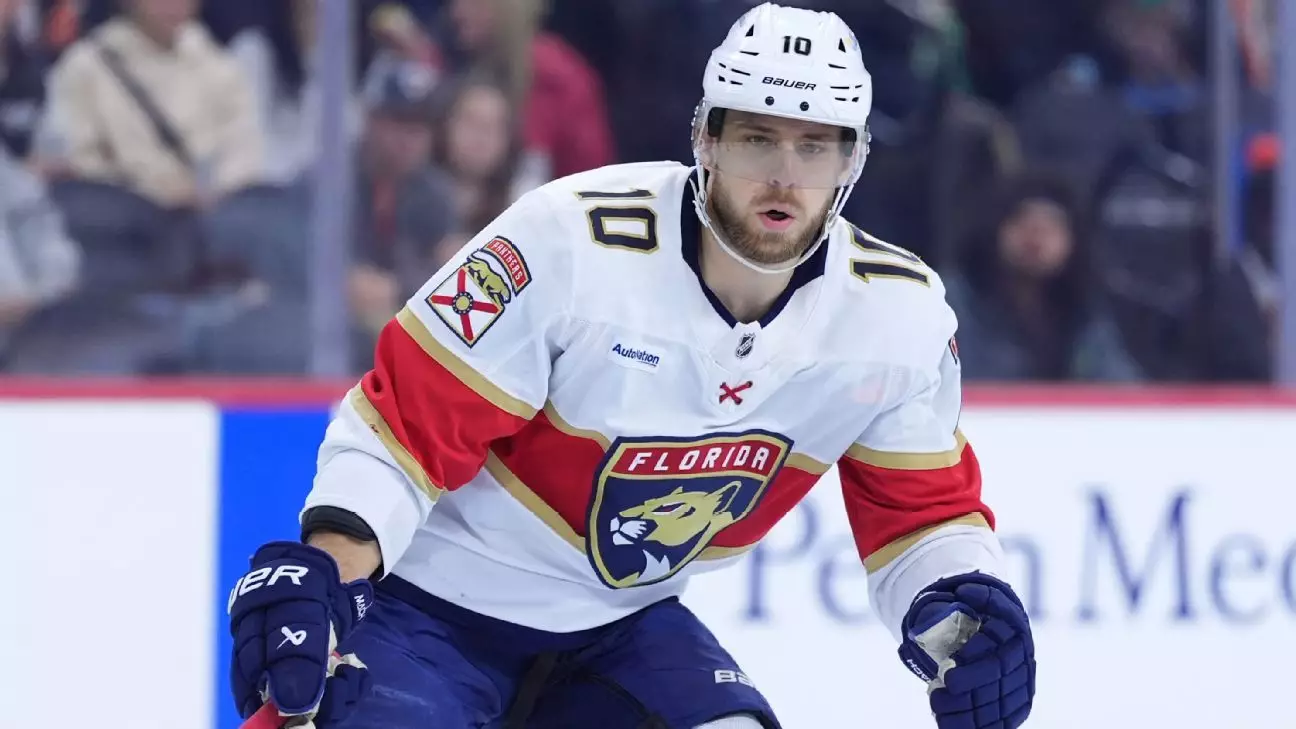As the Florida Panthers prepare for a pivotal Game 3 in the Stanley Cup Final against the Edmonton Oilers, all eyes are on forward A.J. Greer, who is poised to make his much-anticipated debut in this high-stakes series. After a two-game absence due to an undisclosed injury, Greer’s return is not just a boost to the lineup but also a testament to the perseverance and determination that characterizes both him and his team. Coach Paul Maurice confirmed Greer’s inclusion in the squad, recognizing the impact this player has had during the playoffs, with the Panthers holding an impressive record of 10-2 when Greer is on the ice.
Greer’s journey is reflective of the trials many players face in the NHL, embodying the struggles of not just trying to fit into a roster but also grappling with personal expectations and aspirations. Having last played in the decisive Game 5 against the Carolina Hurricanes, Greer understands the weight of this moment. He highlighted the emotional toll of watching from the sidelines, a sentiment that resonates widely in professional sports, where the camaraderie and urgency of competition can often overshadow individual health concerns.
Defining the Role
What stands out about Greer is his clear understanding of his role within the team dynamic. Eager to contribute without overcomplicating his approach, he emphasizes the importance of playing to his strengths. “I’m not trying to change anything,” he stated, showcasing a mature perspective that combines both personal ambition and team-oriented thinking. It demonstrates an admirable acceptance of one’s position—his primary goal being to support his linemates Jonah Gadjovich and Tomas Nosek while setting the stage for subsequent lines.
This mindset is particularly vital as players often grapple with identity in a league that values versatility and adaptability. Greer’s willingness to assume the role of a depth forward—essentially a player who may not always get significant ice time but has the potential to swing the momentum—illustrates a profound understanding of how the NHL functions today. In a sense, he is not just a player, but a specialist in creating space and opportunities for more prominent figures in the lineup.
The Mental Game
Greer’s uphill battle didn’t always appear so promising. Reflecting on dark times in 2021, while he was part of the Bridgeport Islanders in the AHL, he contemplated abandoning his NHL aspirations for a European league that might afford him more playing time. The temptation to seek a path away from the NHL speaks to the emotional and psychological hurdles that can accompany professional athleticism. One wrong move, one poor season, and a player’s career trajectory can pivot dramatically, throwing their future into uncertainty.
Yet Greer chose resilience. He chose to embrace a mindset shift, moving away from the “victim mentality” that can plague many struggling athletes. This important realization not only helped him become a valuable team member but also fortified his long-term career prospects. His statement about learning to appreciate his contributions, no matter how small they may seem, reveals a level of maturity often achieved after considerable hardship.
The Importance of Team Dynamics
As the Panthers venture into the Stanley Cup Final, Greer’s return is significant not just for his contributions on ice but also for what he represents—a journey of resilience and determination that resonates deeply within sports culture. The synergy that Greer forms with Gadjovich and Nosek highlights the importance of teamwork in achieving a collective goal. In moments of pressure, the chemistry and trust such players develop can be the difference-makers in tight matches.
In reflecting on Greer’s story, fans and players alike are reminded that while skill undoubtedly sets the stage, mental toughness and emotional resilience ultimately define a player’s career trajectory. A.J. Greer, once with doubts about his future, now stands set to not only fulfill a role but also inspire a narrative about what it truly means to fight back against adversity in the world of professional sports.


Leave a Reply